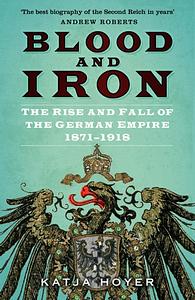Take a photo of a barcode or cover
Rating it four stars for doing what it sets out to do very well - laying out a concise, structured telling of the rise and fall of Wilhelmine Germany. I listened to the whole thing as an audio book on a long drive and never once got bored with it, which is quite a feat in itself.
One detail I did find a bit jarring is that the focus stays very much on the political, and while I might be wrong in this assessment as this is the first I've read of Hoyer's work, I found her judgement of more-than-controversial political figures - such as Wilhelm II - very lenient in some places. There is a notable lack of in-depth treatment of social issues, and in this vein, an abridged glossing over of Germany's colonial history that bothered me quite a bit.
Overall, though, a solid piece of scholarship. But I have to ask - just who keeps designing the covers for these things and getting away with it?
One detail I did find a bit jarring is that the focus stays very much on the political, and while I might be wrong in this assessment as this is the first I've read of Hoyer's work, I found her judgement of more-than-controversial political figures - such as Wilhelm II - very lenient in some places. There is a notable lack of in-depth treatment of social issues, and in this vein, an abridged glossing over of Germany's colonial history that bothered me quite a bit.
Overall, though, a solid piece of scholarship. But I have to ask - just who keeps designing the covers for these things and getting away with it?
Hoyer's history of the German Empire through the end of WW1 managed to be both consise and thorough. I was impressed, and will definitely read her history of East Germany after WW2, [b:Beyond the Wall: East Germany, 1949-1990|61403418|Beyond the Wall East Germany, 1949-1990|Katja Hoyer|https://i.gr-assets.com/images/S/compressed.photo.goodreads.com/books/1677147473l/61403418._SY75_.jpg|96876676].
Having read Blood and Iron, I'm now ready to jump right into Shirer's Rise and Fall of the Third Reich, armed with the relevant backstory.
Having read Blood and Iron, I'm now ready to jump right into Shirer's Rise and Fall of the Third Reich, armed with the relevant backstory.
reflective
medium-paced
Disappointingly basic. Felt like it was pitched to a high school level, which wasn't what I was looking for.
I have been waiting for so long for this book, and for different reasons at different times. 10 years ago it would have been for military history of early Germany, recently it has been more for the burgeoning (but very sizable) socialist movements there at that time and the massive and rapid leaps in living standards brought about by social programs. This book provides both and far more. Before this, information on this period in Germany was relegated to maybe 30 pages in the introduction of a book on WWI. Although it is short, this book covers the topic so well and even manages to leave the reader with overarching themes.
The real German empire was not the regressive, hyper militant, and bloodthirsty nation depicted by France and Britain both in the past as well as today. Neither was it a glorious time of nationalist unity and purpose idealized by future generations of Germans after 1918. It was a society sharply divided by class, religion, and political views with a government flawed from the state. However, it also created the first welfare state in the world (put into effect by a vehement anti-socialist btw), achieved the highest living and labor standards of the day (FAR superior to England's at the time), and created one people and culture out of disparate regions, religions, and cultures.
If I had to choose one critique of this book, it would be a lack of attention on German colonialism. Yes, it was a smaller scale and shorter time period than the other major powers, but it was still quite important, and events like the herero genocide need more than one passing mention. I understand this may have been a publisher demand though to keep the book a certain length. All in all, it is a fantastic and much needed book that provides great information on the politics and society of the German empire while also being a quick and enjoyable read.
The real German empire was not the regressive, hyper militant, and bloodthirsty nation depicted by France and Britain both in the past as well as today. Neither was it a glorious time of nationalist unity and purpose idealized by future generations of Germans after 1918. It was a society sharply divided by class, religion, and political views with a government flawed from the state. However, it also created the first welfare state in the world (put into effect by a vehement anti-socialist btw), achieved the highest living and labor standards of the day (FAR superior to England's at the time), and created one people and culture out of disparate regions, religions, and cultures.
If I had to choose one critique of this book, it would be a lack of attention on German colonialism. Yes, it was a smaller scale and shorter time period than the other major powers, but it was still quite important, and events like the herero genocide need more than one passing mention. I understand this may have been a publisher demand though to keep the book a certain length. All in all, it is a fantastic and much needed book that provides great information on the politics and society of the German empire while also being a quick and enjoyable read.
informative
medium-paced
A brilliant yet succinct characterization of the first unified German nation. I honestly really enjoyed this book and have to give kudos to the author for making the language very accessible. She didn’t beat around the bush and was good at pushing the narrative forward without meandering. It is definitely a great introduction to this era of German history.
Pacy history of high politics in the German Empire. Perhaps a bit too pacy at times - I wanted some more.
informative
fast-paced
Thoroughly informative and very interesting. This book taught me a lot about a period in which I knew next to nothing about prior to reading with regards to the formation of Imperial Germany.
Well presented history. Easy to follow for someone who didn't really know much about the founding of the German Empire. Hoyer clarifies the role of the Kaisers and Bismarck. Tragic when you see the many events and errors of the 1900 decade as a lead-up to WWI.




